情态动词1.(can ,may,will,shall)
情态动词的用法及其表达的意义
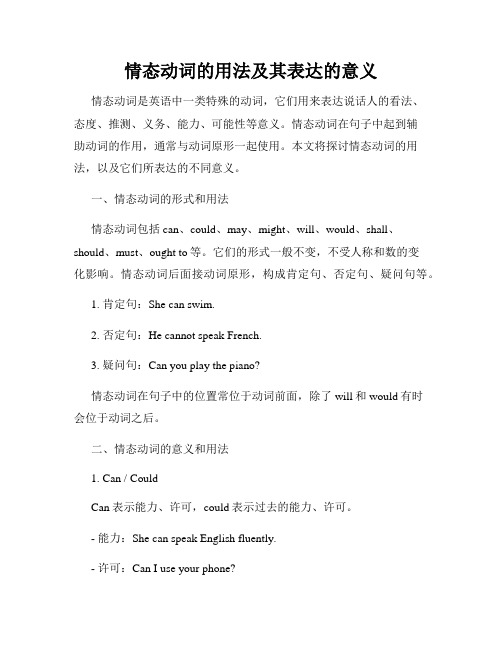
情态动词的用法及其表达的意义情态动词是英语中一类特殊的动词,它们用来表达说话人的看法、态度、推测、义务、能力、可能性等意义。
情态动词在句子中起到辅助动词的作用,通常与动词原形一起使用。
本文将探讨情态动词的用法,以及它们所表达的不同意义。
一、情态动词的形式和用法情态动词包括can、could、may、might、will、would、shall、should、must、ought to等。
它们的形式一般不变,不受人称和数的变化影响。
情态动词后面接动词原形,构成肯定句、否定句、疑问句等。
1. 肯定句:She can swim.2. 否定句:He cannot speak French.3. 疑问句:Can you play the piano?情态动词在句子中的位置常位于动词前面,除了will和would有时会位于动词之后。
二、情态动词的意义和用法1. Can / CouldCan表示能力、许可,could表示过去的能力、许可。
- 能力:She can speak English fluently.- 许可:Can I use your phone?Could也可以用于表示请求或委婉的建议:- 请求:Could you please help me with my luggage?- 建议:You could try the new restaurant in town.2. May / MightMay表示许可、可能性,might表示过去或将来的可能性。
- 许可:May I borrow your pen?- 可能性:I may go to the party tonight.Might也可以用于表示不太可能的情况:- 不太可能:He might not come to the meeting.3. Will / WouldWill表示意愿、预测,would表示过去的意愿、假设。
- 意愿:I will help you with your project.- 预测:It will rain tomorrow.Would也可以用于表示委婉的请求或建议:- 请求:Would you mind closing the window?- 建议:You would feel better if you took a break.4. Shall / ShouldShall通常用于第一人称,表示建议、义务,should则表示建议、期望。
情态动词小结(共五则)

情态动词小结(共五则)第一篇:情态动词小结情态动词小结情态动词有:can(could),may(might),must,have to, shall(should),will(would),need, dare, ought to等。
一.情态动词can, may, must用法㈠基本用法1.can ⑴ 会,能够--Can you swim?--Yes, I can.--No, I can‟t.⑵口语中代替may.You can(may)park here.你可以把车停在这里。
(许可)2.may允许,许可--May I come in?--Yes, you may./Sure, come on in.--No, you mustn ‟t./No, you can‟t.No, you‟d better not.3.must必须--Must we finish the exercise today?--Yes, you must.--No, you needn‟t./No, you don‟t have to.4.need 需要,必需--Need you go now?=--Must you go now?--Yes, I must.--Yes, I must.--No, I needn‟t.--No, I needn‟t.(need作为情态动词,通常用在否定句和疑问句中。
)注意一:can 与be able to 都可以表示“能力”,区别是:⑴ can只有现在和过去两种形式I can play the piano.She couldn‟t play the piano when she was a little girl.⑵ be able to ①有更多的形式和时态We shall/will be able to finish the work next week.I haven‟t been able to find the book.②指具体一次活动I can swim but I am not able to cross the rough sea.有时两者可以互换: I‟m not able to(can‟t)answer your question.Are you able to(Can you)type(打字)?注意二:could的用法⑴ 作为can的过去式,表示过去的能力。
情态动词的用法区别学会区分情态动词的不同用法

情态动词的用法区别学会区分情态动词的不同用法情态动词的用法区别情态动词是一类特殊的动词,用来表示说话人对某种动作或状态的态度、愿望、能力或推测等情态,在句子中起到限制、修饰其他动词或表达说话人的意愿的作用。
在英语中,常见的情态动词包括can、could、may、might、shall、should、will、would、must等。
理解和正确运用情态动词,对于学习英语的学生来说非常重要。
本文将从情态动词的用法区别展开讨论,帮助读者更好地掌握这一语法知识。
一、表示能力和许可的区别1. can与could的区别can和could都表示能力,但在用法上有一些区别。
can用于一般现在时,表示现在或将来的某种能力,而could则用于一般过去时,表示过去的能力。
例如:He can speak English fluently.(他能说流利的英语。
)He could swim when he was young.(他小时候会游泳。
)此外,could还可用于表示一种委婉的请求或许可。
例如:Could you please pass me the salt?(请你把盐递给我好吗?)2. may与might的区别may与might都表示许可,但may更常用于正式场合,might更常用于非正式场合,且might更加委婉。
例如:May I use your computer?(我可以用你的电脑吗?)Might I borrow your pen? (我能借你的笔用一下吗?)二、表示推测和可能性的区别1. must与may的区别must和may都用于表示推测和可能性,但语气上有一定的差异。
must表示说话人的推测非常肯定,有把握,而may则表示说话人的推测不那么肯定。
例如:She must be tired because she worked all day.(她一定很累,因为整天都在工作。
)She may be tired because she worked all day.(她可能很累,因为整天都在工作。
高中英语语法讲解: 情态动词

高中英语语法讲解:情态动词概述1.共有10个情态动词:can/could, may/might, will/would, shall, should, ought to, must;2个半情态动词need, dare2.特点:(1)情态动词后加动词原形(即不带to的不定式)一起构成谓语;(2)没有人称和数的变化;(3)多数情态动词有过去式,但其过去式有时并不表示时态,而只起“委婉或不确定语气”的作用。
Would you do me a favour? She may/might be watering the flowers now.3.情态动词在句子中可发挥不同作用,如表能力,表责任与义务,表推测,表征求允许,表请求,表建议,表语气态度等等He can/could run 100 meters in 11 seconds.You should/ought to/must work hard to win a gold medal.Can/Could/May/Might I watch the Olympics tonight?Will/Can/Could/Would you help me with my training?He might/may/could/should/ought to/will/must watch the football match tonight.I suggest that you should watch the opening ceremony.Can this be true?4.情态动词+do 表对一般现在或将来情况的推测情态动词+ be doing 表对正在发生的事情的推测情态动词+have done 表对过去已经发生的事情的推测一、can/could 的用法1.表能力(1) can do现在一般的能力(2) could do过去一般的能力(3) could have done过去有能力做但没做具体某事(4)was/were able to do = managed to do/ succeeded in doing 过去有能力做且做了具体某事。
重要知识点总结情态动词与情态副词的区别与用法

重要知识点总结情态动词与情态副词的区别与用法情态动词与情态副词是英语语法中的重要知识点,它们在句子中起到表达说话人的态度和意愿的作用。
虽然它们在形式上相似,但在用法和功能上存在一些区别。
本文将详细总结情态动词与情态副词的区别与用法。
一、情态动词的定义和用法情态动词是一类特殊的助动词,包括can、could、may、might、shall、should、will、would、must等。
它们在句子中表示说话人的看法、意愿、能力、推测、义务等情态。
1. 表示能力和可能性:- Can: 表示能力或许可,常用于表示绝对的能力或技能。
- I can speak English fluently.(我能流利地说英语。
)- Can you lend me some money?(你能借我一些钱吗?)- Could: 过去式形式,表示过去的能力或许可,也可用于委婉地提出请求或建议。
- We could swim when we were young.(我们小时候会游泳。
)- Could you please pass me the salt?(你能给我递一下盐吗?)- May: 表示允许、请求或推测。
- May I go to the restroom?(我可以去洗手间吗?)- It may rain tomorrow.(明天可能会下雨。
)- Might: 过去式形式,表示过去的允许、请求或推测。
与may的区别在于might的语气更委婉、推测性更强。
- She told me I might borrow her book.(她告诉我可以借她的书。
) - He said he might come to the party.(他说他可能会来参加派对。
)2. 表示意愿和建议:- Shall: 表示提议、请求或征求意见。
用于第一人称(I和we)中,常用于问句和疑问句。
- Shall we go for a walk?(我们出去走走吧?)- What shall I do next?(我接下来该做什么?)- Should: 表示应该、建议,常用于表达义务、推荐或提供建议。
情态动词的用法
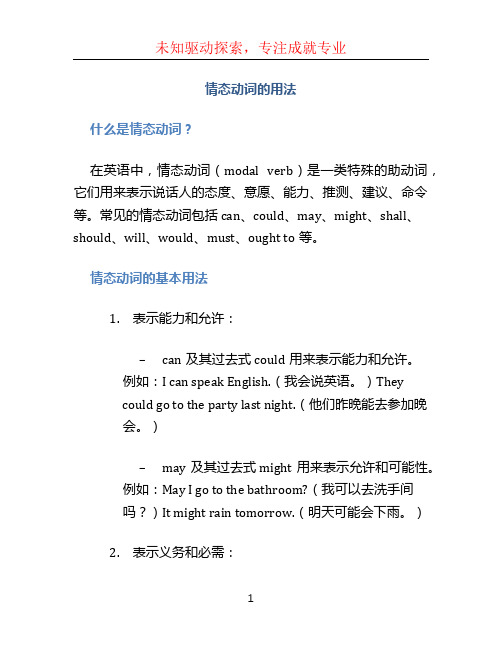
情态动词的用法什么是情态动词?在英语中,情态动词(modal verb)是一类特殊的助动词,它们用来表示说话人的态度、意愿、能力、推测、建议、命令等。
常见的情态动词包括can、could、may、might、shall、should、will、would、must、ought to等。
情态动词的基本用法1.表示能力和允许:–can及其过去式could用来表示能力和允许。
例如:I can speak English.(我会说英语。
)Theycould go to the party last night.(他们昨晚能去参加晚会。
)–may及其过去式might用来表示允许和可能性。
例如:May I go to the bathroom?(我可以去洗手间吗?)It might rain tomorrow.(明天可能会下雨。
)2.表示义务和必需:–must用来表示义务和必需。
例如:You must finish your homework before playing games.(你必须在玩游戏之前完成作业。
)–should用来表示应该和建议。
例如:She should eat more vegetables for her health.(她应该多吃蔬菜保护健康。
)3.表示推测和肯定:–will用来表示未来意愿和不可避免的行为。
例如:I will help you with your presentation.(我会帮你做演讲。
)–would用来表示假设和委婉表达。
例如:If I had more time, I would travel around the world.(如果我有更多时间,我会环游世界。
)情态动词的用法注意事项1.情态动词后接不带to的原形动词,即不加动词的第三人称单数-s形式。
例如:He can swim well.(他游泳游得很好。
)They should study hard.(他们应该努力学习。
情态动词知识点
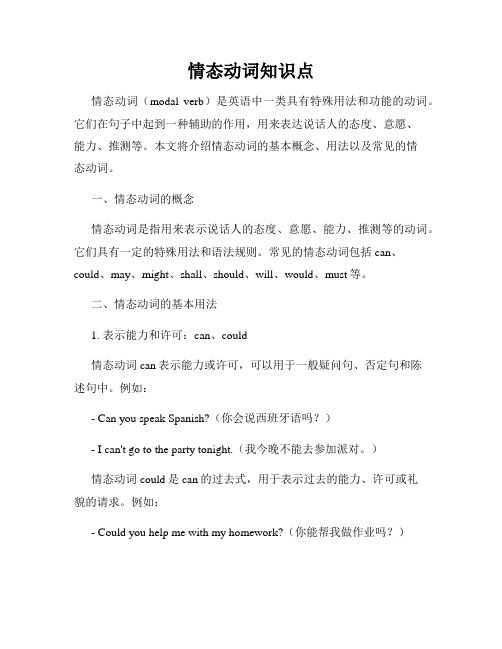
情态动词知识点情态动词(modal verb)是英语中一类具有特殊用法和功能的动词。
它们在句子中起到一种辅助的作用,用来表达说话人的态度、意愿、能力、推测等。
本文将介绍情态动词的基本概念、用法以及常见的情态动词。
一、情态动词的概念情态动词是指用来表示说话人的态度、意愿、能力、推测等的动词。
它们具有一定的特殊用法和语法规则。
常见的情态动词包括can、could、may、might、shall、should、will、would、must等。
二、情态动词的基本用法1. 表示能力和许可:can、could情态动词can表示能力或许可,可以用于一般疑问句、否定句和陈述句中。
例如:- Can you speak Spanish?(你会说西班牙语吗?)- I can't go to the party tonight.(我今晚不能去参加派对。
)情态动词could是can的过去式,用于表示过去的能力、许可或礼貌的请求。
例如:- Could you help me with my homework?(你能帮我做作业吗?)- She could run very fast when she was young.(她年轻时能跑得很快。
)2. 表示可能性和推测:may、might情态动词may和might用于表示可能性或推测,表示事物发生的可能性更大。
might的语气较虚弱,使用较少。
例如:- It may rain tomorrow, so take an umbrella with you.(明天可能会下雨,所以带把伞。
)- He might be busy.(他可能很忙。
)3. 表示义务和建议:shall、should情态动词shall用于第一人称和第三人称中,表示义务或将来的行为。
should用于各种人称中,表示建议或应该的动作。
例如:- Shall I open the window?(我应该打开窗户吗?)- You should eat more fruits and vegetables.(你应该多吃水果和蔬菜。
情态动词的用法
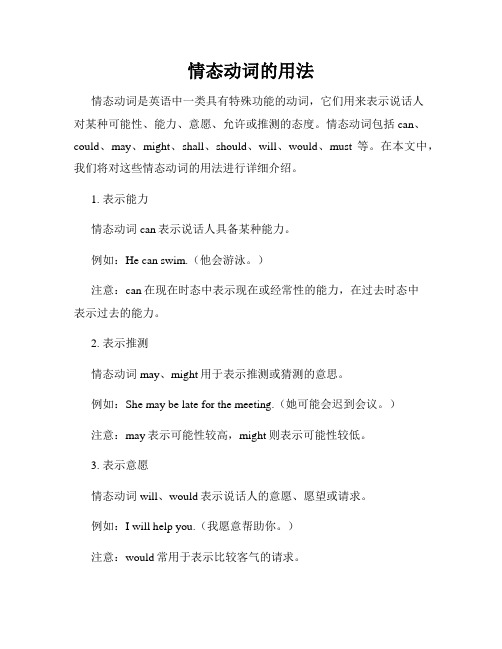
情态动词的用法情态动词是英语中一类具有特殊功能的动词,它们用来表示说话人对某种可能性、能力、意愿、允许或推测的态度。
情态动词包括can、could、may、might、shall、should、will、would、must等。
在本文中,我们将对这些情态动词的用法进行详细介绍。
1. 表示能力情态动词can表示说话人具备某种能力。
例如:He can swim.(他会游泳。
)注意:can在现在时态中表示现在或经常性的能力,在过去时态中表示过去的能力。
2. 表示推测情态动词may、might用于表示推测或猜测的意思。
例如:She may be late for the meeting.(她可能会迟到会议。
)注意:may表示可能性较高,might则表示可能性较低。
3. 表示意愿情态动词will、would表示说话人的意愿、愿望或请求。
例如:I will help you.(我愿意帮助你。
)注意:would常用于表示比较客气的请求。
4. 表示推测的过去情态动词must常用于表示对过去情况的推测或肯定。
例如:He must have missed the bus.(他肯定错过了公交车。
)注意:must用于表示对过去情况的肯定,而might用于表示对过去情况的推测。
5. 表示义务或必要性情态动词must表示对义务、必要性或确定性的肯定。
例如:You must finish your homework.(你必须完成作业。
)6. 表示建议或应该情态动词should表示建议或应该。
例如:You should go to bed early.(你应该早点睡觉。
)注意:should还可以表示对过去情况的推测,例如:He should have arrived by now.(他现在应该已经到达了。
)7. 表示允许或许可情态动词can与may可以用于表示许可或允许。
例如:Can I borrow your pen?(我可以借你的钢笔吗?)8. 表示可能性情态动词could用于表示可能性。
常见的情态动词有

常见的情态动词有情态动词是英语中重要的词类之一,它们强调了说话者对某种态度、情感或推测的表达。
在英语中,一共有十种情态动词,它们分别是 can、could、may、might、shall、should、will、would、must 和 ought to。
下面将分别介绍这十种情态动词的基本用法和常见表达方式。
1. cancan 是情态动词中最常用的一种,用于表示“能力”、“许可”或“可能性”等含义。
例如:- I can speak Chinese fluently.(我说中文说得很流利。
)- Can I borrow your pen for a moment?(我能否借一下你的笔?)- It can be difficult to understand Shakespeare.(理解莎士比亚可能会很困难。
)can 的否定形式是can’t,表示“不能”或“不可能”。
例如:- I can’t run very fast.(我跑不太快。
)- This can’t be true.(这不可能是真的。
)2. couldcould 是 can 的过去式,也可以表示“能力”、“许可”或“可能性”。
它比 can 更委婉,常用于礼貌性的请求、建议或询问。
例如:- Could you please pass me the salt?(你能把盐递给我吗?)- I think we could try to finish this project by next week.(我想我们下周会试着完成这个项目。
)- It could rain later, so take an umbrella just in case.(天气可能会下雨,所以带把伞以防万一。
)could 的否定形式是couldn’t,表示“不能”或“不可能”。
例如:- I couldn’t understand what he was saying.(我听不懂他在说什么。
情态动词在疑问句中的用法详解
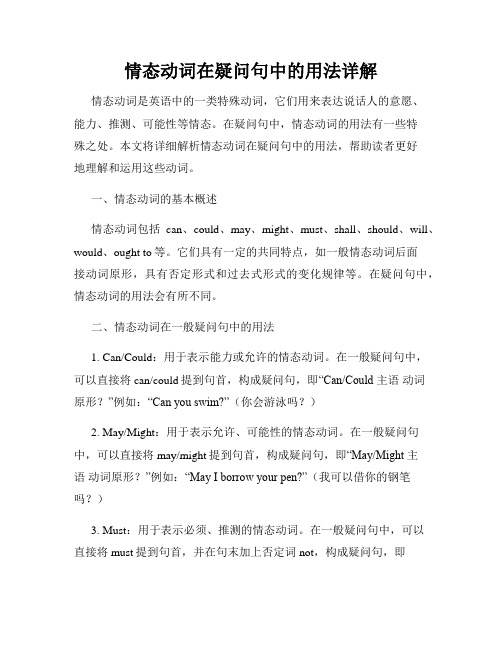
情态动词在疑问句中的用法详解情态动词是英语中的一类特殊动词,它们用来表达说话人的意愿、能力、推测、可能性等情态。
在疑问句中,情态动词的用法有一些特殊之处。
本文将详细解析情态动词在疑问句中的用法,帮助读者更好地理解和运用这些动词。
一、情态动词的基本概述情态动词包括can、could、may、might、must、shall、should、will、would、ought to等。
它们具有一定的共同特点,如一般情态动词后面接动词原形,具有否定形式和过去式形式的变化规律等。
在疑问句中,情态动词的用法会有所不同。
二、情态动词在一般疑问句中的用法1. Can/Could:用于表示能力或允许的情态动词。
在一般疑问句中,可以直接将can/could提到句首,构成疑问句,即“Can/Could 主语动词原形?”例如:“Can you swim?”(你会游泳吗?)2. May/Might:用于表示允许、可能性的情态动词。
在一般疑问句中,可以直接将may/might提到句首,构成疑问句,即“May/Might 主语动词原形?”例如:“May I borrow your pen?”(我可以借你的钢笔吗?)3. Must:用于表示必须、推测的情态动词。
在一般疑问句中,可以直接将must提到句首,并在句末加上否定词not,构成疑问句,即“Must 主语动词原形?”例如:“Must I finish the project today?”(我必须今天完成这个项目吗?)4. Shall/Should:用于表示建议、意图的情态动词。
在一般疑问句中,可以直接将shall/should提到句首,构成疑问句,即“Shall/Should 主语动词原形?”例如:“Shall we go to the park tomorrow?”(明天我们去公园好吗?)5. Will/Would:用于表示意愿、请求的情态动词。
在一般疑问句中,可以直接将will/would提到句首,构成疑问句,即“Will/Would 主语动词原形?”例如:“Will you help me with my homework?”(你能帮我做作业吗?)6. Ought to:用于表示应该、责任的情态动词。
情态动词的意义和用法
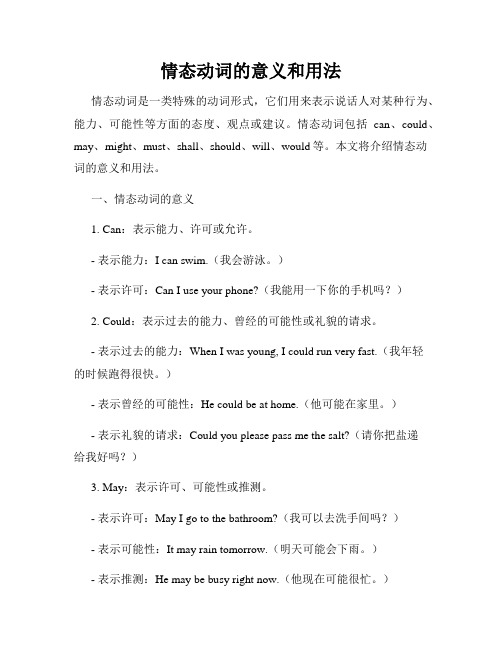
情态动词的意义和用法情态动词是一类特殊的动词形式,它们用来表示说话人对某种行为、能力、可能性等方面的态度、观点或建议。
情态动词包括can、could、may、might、must、shall、should、will、would等。
本文将介绍情态动词的意义和用法。
一、情态动词的意义1. Can:表示能力、许可或允许。
- 表示能力:I can swim.(我会游泳。
)- 表示许可:Can I use your phone?(我能用一下你的手机吗?)2. Could:表示过去的能力、曾经的可能性或礼貌的请求。
- 表示过去的能力:When I was young, I could run very fast.(我年轻的时候跑得很快。
)- 表示曾经的可能性:He could be at home.(他可能在家里。
)- 表示礼貌的请求:Could you please pass me the salt?(请你把盐递给我好吗?)3. May:表示许可、可能性或推测。
- 表示许可:May I go to the bathroom?(我可以去洗手间吗?)- 表示可能性:It may rain tomorrow.(明天可能会下雨。
)- 表示推测:He may be busy right now.(他现在可能很忙。
)4. Might:表示可能性或推测(比may的可能性更小)。
- 表示可能性:She might come to the party tonight.(她可能会来参加今晚的派对。
)- 表示推测:They might be lost.(他们可能迷路了。
)5. Must:表示必须或肯定性的推测。
- 表示必须:You must finish your homework before going out.(你必须在出门前完成作业。
)- 表示肯定性的推测:He must be tired after working all day.(他整天工作一定很累。
情态动词及用法
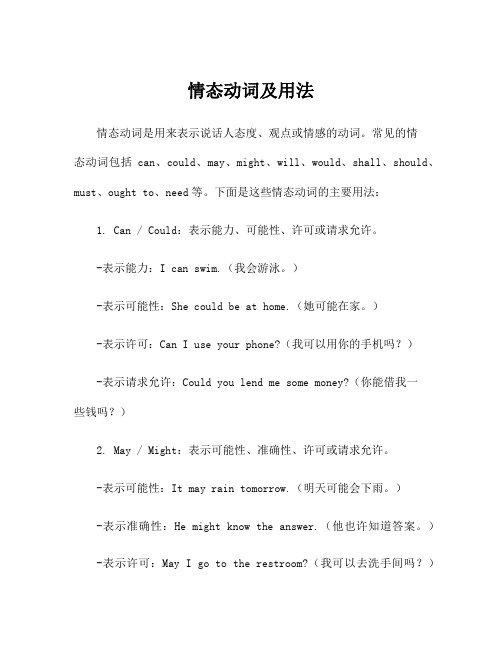
情态动词及用法情态动词是用来表示说话人态度、观点或情感的动词。
常见的情态动词包括can、could、may、might、will、would、shall、should、must、ought to、need等。
下面是这些情态动词的主要用法:1. Can / Could:表示能力、可能性、许可或请求允许。
-表示能力:I can swim.(我会游泳。
)-表示可能性:She could be at home.(她可能在家。
)-表示许可:Can I use your phone?(我可以用你的手机吗?)-表示请求允许:Could you lend me some money?(你能借我一些钱吗?)2. May / Might:表示可能性、准确性、许可或请求允许。
-表示可能性:It may rain tomorrow.(明天可能会下雨。
)-表示准确性:He might know the answer.(他也许知道答案。
)-表示许可:May I go to the restroom?(我可以去洗手间吗?)-表示请求允许:Might I borrow your pen?(我可以借用你的笔吗?)3. Will / Would:表示意愿、习惯、请求、承诺或预测。
-表示意愿:I will help you.(我愿意帮助你。
)-表示习惯:She would always go for a walk after dinner.(她习惯饭后散步。
)-表示请求:Would you please close the door?(请你关上门好吗?)-表示承诺:I would do my best to finish the project.(我会尽力完成这个项目。
)-表示预测:It will rain tomorrow.(明天将会下雨。
)4. Shall / Should:表示建议、命令、义务或预测。
-表示建议:You should exercise regularly.(你应该经常运动。
情态动词用法总结归纳
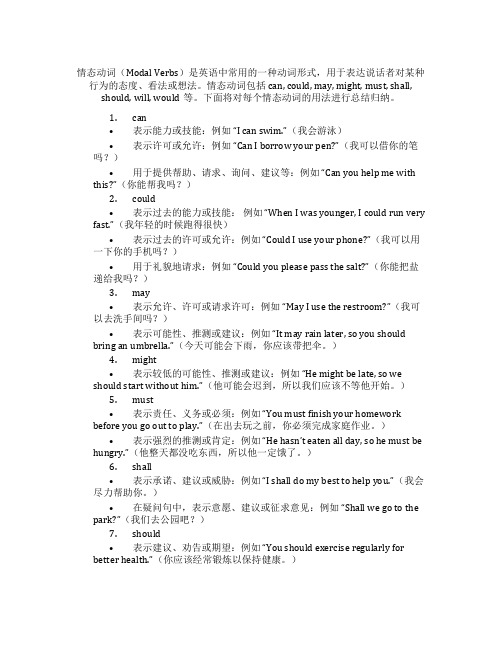
情态动词(Modal Verbs)是英语中常用的一种动词形式,用于表达说话者对某种行为的态度、看法或想法。
情态动词包括can, could, may, might, must, shall, should, will, would等。
下面将对每个情态动词的用法进行总结归纳。
1.can•表示能力或技能:例如“I can swim.”(我会游泳)•表示许可或允许:例如“Can I borrow your pen?”(我可以借你的笔吗?)•用于提供帮助、请求、询问、建议等:例如“Can you help me with this?”(你能帮我吗?)2.could•表示过去的能力或技能:例如“When I was younger, I could run very fast.”(我年轻的时候跑得很快)•表示过去的许可或允许:例如“Could I use your phone?”(我可以用一下你的手机吗?)•用于礼貌地请求:例如“Could you please pass the salt?”(你能把盐递给我吗?)3.may•表示允许、许可或请求许可:例如“May I use the restroom?”(我可以去洗手间吗?)•表示可能性、推测或建议:例如“It may rain later, so you should bring an umbrella.”(今天可能会下雨,你应该带把伞。
)4.might•表示较低的可能性、推测或建议:例如“He might be late, so we should start without him.”(他可能会迟到,所以我们应该不等他开始。
)5.must•表示责任、义务或必须:例如“You must finish your homewor k before you go out to play.”(在出去玩之前,你必须完成家庭作业。
)•表示强烈的推测或肯定:例如“He hasn’t eaten all day, so he must be hungry.”(他整天都没吃东西,所以他一定饿了。
初中情态动词用法总结

初中情态动词用法总结情态动词是用来表达说话人的态度、情感和推测等的特殊动词。
情态动词包括can、could、may、might、must、shall、should、will、would、ought to等。
以下是初中情态动词的用法总结:1. Can和Could:- 表示能力、技能、许可或请求的可能性:I can swim.(我会游泳。
)Could you open the door for me, please?(请你开门好吗?)- 表示可能性或推测:It can't be true.(那不可能是真的。
)Could he be the one who took my book?(他可能是拿走了我的书的那一个人吗?)2. May和Might:- 表示许可、请求或可能性:May I use your pen?(我可以用你的笔吗?)She might be late.(她可能会迟到。
)- 表示祝愿或警告:May you have a happy birthday!(祝你生日快乐!)You may get hurt if you do that.(你这样做可能会受伤。
)3. Must:- 表示推测或肯定:It must be raining outside.(外面肯定在下雨。
)- 表示义务或责任:You must finish your homework before going out to play.(出去玩之前你必须完成作业。
)4. Shall和Should:- 表示提议、请求、建议或义务:Shall we go to the park together?(我们一起去公园好吗?)You should study harder for the test.(你应该更努力地学习应考试。
)5. Will和Would:- 表示将来的意愿、决心或意志:I will help you with your project.(我会帮助你完成你的项目。
情态动词口诀顺口溜

情态动词口诀顺口溜以下是一个关于情态动词的口诀顺口溜:情态动词很重要,用法需要记心上。
Can 表能力或请求,Could 过去也能用。
May 表许可或可能,Might 委婉语气柔。
Must 必须或肯定,Shall 一三人称建议。
Should 应该或竟然,Will 将来或意愿。
Would 过去将来时,虚拟语气也常用。
记清意思和用法,情态动词不发愁。
以下是一个关于情态动词的口诀顺口溜,希望对你有所帮助:情态动词有 can、could、may、might、must、shall、should、will、would,用法需记牢。
can 表能力,could 表过去,may 表许可,might 表委婉。
must 表必须,shall 用于一三人称表建议,should 表应该,will 表将来,would 表过去将来。
记清意思和用法,情态动词不再难。
除了上面提到的用法,情态动词还有以下几种常见用法:1. 表示推测:情态动词可以表示对过去、现在或将来的推测。
例如:- He must be at home.(他一定在家。
)- She may come tomorrow.(她可能明天来。
)- They could have finished the work.(他们可能已经完成了工作。
)2. 表示虚拟语气:在虚拟语气中,情态动词表示与事实相反的情况。
例如:- If I were you, I would study harder.(如果我是你,我会更努力学习。
)- He could have passed the exam if he had studied harder.(如果他学习更努力,他本来可以通过考试的。
)3. 表示习惯或倾向:情态动词可以表示习惯或倾向。
例如:- He often goes to the gym.(他经常去健身房。
)- She will sit in the front row.(她会坐在前排。
情态动词的否定式

情态动词的否定式情态动词是用来表示说话人对某种行为或状态的看法、态度或推测的一类动词。
在英语中,情态动词包括can、could、may、might、will、would、shall、should、must、ought to。
当我们在使用情态动词时,有时需要表达否定的意思。
下面是一些常见的情态动词的否定形式及其用法。
1. can't: 表示"不能"或"不会"例句:- She can't swim. (她不会游泳。
)- I can't come to the party tonight. (我今晚不能来参加聚会。
)2. couldn't: 表示"不能"或"不会"(过去时)例句:- I couldn't find my keys this morning. (今天早上我找不到我的钥匙。
)- He couldn't understand the instructions. (他不能理解这些说明。
)3. may not: 表示"可能不"或"不可能"例句:- It may not rain tomorrow. (明天可能不会下雨。
)- You may not enter without a ticket. (没有票,你可能不被允许进入。
)4. might not: 表示"可能不"或"不可能"(更加不确定)例句:- She might not come to the meeting. (她可能不会来参加会议。
)- I might not be able to finish the project on time. (我可能无法按时完成这个项目。
)5. will not/won't: 表示"不会"或"将不会"例句:- He will not be able to attend the meeting tomorrow. (他明天不会能够出席会议。
情态动词的用法总结

情态动词的用法总结情态动词是一类特殊的动词,用来表示说话人对其中一种行为、状态或可能性的态度、判断、推测、愿望等情态。
情态动词有can,could,may,might,will,shall,should,would,must等。
它们在语法上有一些特殊的用法和用法限制。
以下是情态动词的用法总结:1.表示能力和许可:- Can/could:用来表示能力,做事的方式上拥有能力或技能。
例如:I can swim.(我会游泳。
)- May/might:用来表示允许或许可。
例如:May I go to the bathroom?(我可以去洗手间吗?)- Will/would:用来表示请求或许可。
例如:Would you please close the door?(你能关门吗?)2.表示推测和可能性:- May/might:用来表示推测、猜测或可能性。
例如:He may be at home.(他可能在家。
)- Could:用来表示一种可能性或假设的情况。
例如:He could bein the park.(他可能在公园。
)3.表示义务和必要性:- Must:用来表示义务、必要性或推测。
例如:You must finish your homework.(你必须完成作业。
)- Should:用来表示建议、责任或推测。
例如:You should apologize for your behavior.(你应该为你的行为道歉。
)4.表示愿望和偏好:- Would:用来表示过去或不太可能实现的愿望或偏好。
例如:I would love to go on vacation.(我很想去度假。
)需注意的是,情态动词具有一些特殊的用法和词语组合,例如情态动词后接动词原形、后接动词不定式的完成式形式等。
使用情态动词时需要根据具体语境和句子结构进行合理搭配与运用。
初中英语:情态动词

初中英语:情态动词介绍:情态动词是英语中的一个重要语法点,它们可以用来表示可能性、必要性、责任、建议等等。
在英语口语中,情态动词的使用非常频繁,但是不同的情态动词的用法又各有不同,因此,我们有必要系统地学习情态动词的用法。
本文将为大家详细介绍情态动词的用法,并提供大量的练习题和答案,帮助大家掌握情态动词的用法,让你的英语口语更加流利。
一、情态动词的概念情态动词是指表示说话人对所说内容态度、说话人主观意愿、能力、建议、命令、禁止等的动词。
常用的情态动词有can、could、may、might、must、shall、should、will、would 等九个词。
二、情态动词的用法1.表示能力、许可、建议、命令、禁止等情况1) Can / CouldCan 表示现在或未来有能力做某事;Could 表示过去或未来有能力做某事,或表示委婉语气。
如:I can swim.(我会游泳。
)Could you open the window?(你能帮忙把窗户打开吗?)2) May / MightMay 表示有可能;Might 表示有可能性的弱化。
如:It may rain tomorrow.(明天可能会下雨。
)I might go to the party.(我可能去参加聚会。
)3) MustMust 表示必须,有义务或责任做某事。
如:You must wear a seat belt in the car.(在车上必须系安全带。
)I must finish my homework tonight.(我今晚必须完成作业。
)4) Shall / ShouldShall 表示说话人的意愿,用于提出建议或征求意见;Should 表示应该做某事,并且有义务去做。
如:Shall we go to the cinema tonight?(今晚我们去看电影好吗?)You should stop smoking.(你应该戒烟。
)5) Will / WouldWill 表示意愿、意图和承诺;Would 表示委婉请求和含蓄的建议。
- 1、下载文档前请自行甄别文档内容的完整性,平台不提供额外的编辑、内容补充、找答案等附加服务。
- 2、"仅部分预览"的文档,不可在线预览部分如存在完整性等问题,可反馈申请退款(可完整预览的文档不适用该条件!)。
- 3、如文档侵犯您的权益,请联系客服反馈,我们会尽快为您处理(人工客服工作时间:9:00-18:30)。
情态动词1.can / coulda.表示能力He can speak a littleJapanese in addition toEnglish.Man cannot live without air.Can you finish this work tonight?b.表示许可You can(not) have thebook.Can I use yourphone?could也可表示请求,语气更委婉,主要用于疑问句,不可用于肯定句,答语应用can(即:could不能用于现在时态的简略答语中),如:--Could l come to see you tomorrow morning7--Yes,you can.(否定答语可用No,I'm afraid not.) Could you please …? Could I use yourdictionary? --- Yes, you can.c. 有时候会He is a bad-tempered fellow, but sometimes he can be charming.They can be very valuable.d. 在否定句和疑问句中表示猜测(can’t不可能) Someone is knocking. Who can it be?It can’t be Mr. Li. Because he is away on business.不可能,肯定不It can’t have rained last night, for it is dry outside.e. 与possibly 连用; 用于as…as one canCan/could sb. possibly Can he possibly come? What on earth can she possibly mean?I will come back as soon as I can.Sb. can't/couldn't possibly 某人不可能I can't possibly allow youto go home in this weather. f. 表示惊异,怀疑不相信的态度.(主要用在否定句、疑问句或惊叹句中)如:Can this be true?How can you be so rude! This cannot be done by Mary. How can you be so rude!注意:can 与be able to 区别:can表能力,只用一般过去时和一般现在时be able to表能力+成功,即最终设法做成了某事。
有各种时态,可以与别的情态动词连用。
The fire spread through the hotel very quickly, but everyone ______ get out.(NMET97)A. was able toB. couldC. had toD. wouldg.固定句型can not … too /can never … too 再也不过分You can never be too careful.We can never attach toomuch importance to balanced diet.2. may / mighta. 表示允许, might 语气更委婉在表示请求、允许时,might比may的语气更委婉一些,否定回答时要用mustn't,表示"不可以"、"禁止"、"阻止"之意.如:You may drive the car.--Might l use your pen?--No,you mustn't .用May I...征询对方许可在文体上比较正式,在口气上比较客气。
在日常口语中,用Can I...征询对方意见更为常见。
May I use your ruler?--- Yes, help yourself. / Yes, you may.--- No, you mustn’t.b. 表示可能性, might 语气更弱He may feel bored.He may have read it before.c. 用于祈使句中表示祝愿。
如:May you succeed!May God bless you!d. 用于目的和让步状语从句中,表强调I may be slow, but at leastI don’t make mistakes.Write to him at once, sothat he may know it in time.e. 固定搭配:may/might as well 不妨,还不如There’s no bus. We may as well go home on foot now. may well 很有可能What you say may well be true.f. 用于虚拟语气中Had they known what was coming next, they _______ second thoughts.(2012浙江高考19)A. may haveB. could haveC. must have hadD. would have had3. will/ woulda.表示将来时He said he would waitfor me.b.表示请求或建议, would语气更委婉Will / would you typethis, please?Would you pass me thebook?c.表示意愿I will pay you themoney you ask.My car won’t start.d. 表示习惯,will 表示现在的习惯,would表示过去的习惯,区别:used to现已无此习惯A drowning man will catch at a straw(稻草) .He would sit there for hours, doing nothing.The wound would not heal(愈合).During the vacation he would visit me every week.In winter morning she would sit at the gate waiting for his son.e. 表示决心I will never do that again.f. 用"will be"和"will+have+过去分词"的结构表示推测,主要用于第二、三人称。
前者表示对目前情况的推测,后者表示对已经完成的动作或事态的推测。
如:This will be the book you want.He will have arrived by now。
It would be about ten when he left home.I thought he would have told you a11 about it.4. shall(shan’t)a. 用于第一三人称的疑问句,表示说话人征求对方的意见或向对方请示。
Shall I turn on the TV? Shall the boy come in? let’s go for a walk, shall we? Let us go for a walk, willyou?b. 用于二三人称的陈述句表示说话人给对方的命令、警告、允诺、威胁或决心等。
You shall have the money as soon as I get it.He shan't come here.(I won't let him come.)You shall fail if you don't work harder.(警告)He shall have the book when l finish reading.(允诺)He shall be punished.(威胁)c. 用于法律、法规条文、合同等,按规定应该履行的义务等。
All payment shall be made in cash,according to the agreement.Anyone who drives after drinking alcohol_________ be punished according to the traffic regulations.A. canB. shallC.may D. could1.There’s no light on---they ________ be at home.A. can’tB. mustn’tC. needn’tD. shouldn’t2.---Is Jack on duty today?--- It _______ be him. It’s his turn tomorrow.A. mustn’tB. won’tC. can’tD. needn’t3. We hope that as many people as possible ______joinus for the picnic tomorrow.A. needB. mustC. shouldD. can4. ---What’s the name?---Khulaifi. _______ I spell that for you?A. ShallB. WouldC. CanD. Might5. ---Mr. Gordon asked me to remind you of the meeting this afternoon.Don’t you forget it!--- OK, I ________. A. won’t B. don’tC. willD. do6. Helen ________ go on the trip with us, but she isn’t quitesure yet.A. shallB. mustC. mayD. can7. “The interest ________ be divided into five parts, according to the agreement made byboth sides,”declared the judge.A. mayB. shouldC. mustD. shall8. You might just as well tell the manufacturer that male customers_________ not like the design of the furniture.A. mustB. shallC. mayD. need9. You ______ betired---you’ve only been working for an hour.A. must notB. won’tC. can’tD. may not10. You ______ betired---you’ve only been working for an hour. A. must not B. won’tC. can’tD. may not11. Mum, I’ve been studying English since 8 o’clock. ______ I go out and play with Tom for a while?A. Can’tB. Wouldn’tC. May notD. Won’t12. How _______ you say that you really understand the whole story if you have covered only part of the article?A. canB. mustC. needD. may13. ---I heard they went skiing in the mountains last winter.--- It ____ true because there was little snow there.A. may not beB. won’t beC. couldn’t beD. mustn’t be14. It has been announcedthat candidates ______remain in their seatsuntil all the papershave been collected.A. canB. willC.may D. shall15. He ______ you morehelp, even though hewas very busy.A. might have givenB. might giveC. may have givenD. may give16. Jenny______ have kepther word. I wonderwhy she changed hermind.A. mustB.should C.need D. would 17. ---Could I borrow yourdictionary?---Yes, of courseyou_________A. mightB. willC. canD.should18. —Shall I tell Johnabout it?—No, you ______ . I'vetold him already.A. needn'tB.wouldn't C.mustn't D.shouldn't19. ─There were alreadyfive people in the carbut they managed totake me as well.─It______ acomfortable journey.A. can't beB. shouldn't beC. mustn't havebeen D. couldn't have been20. The fire spreadthrough the hotel veryquickly but everyone______ get out.A. had toB. wouldC. couldD. wasable to21. When he was there,he______ go to that coffee shop at the corner after work every day. A. would B. should C. hadbetter D. might。
